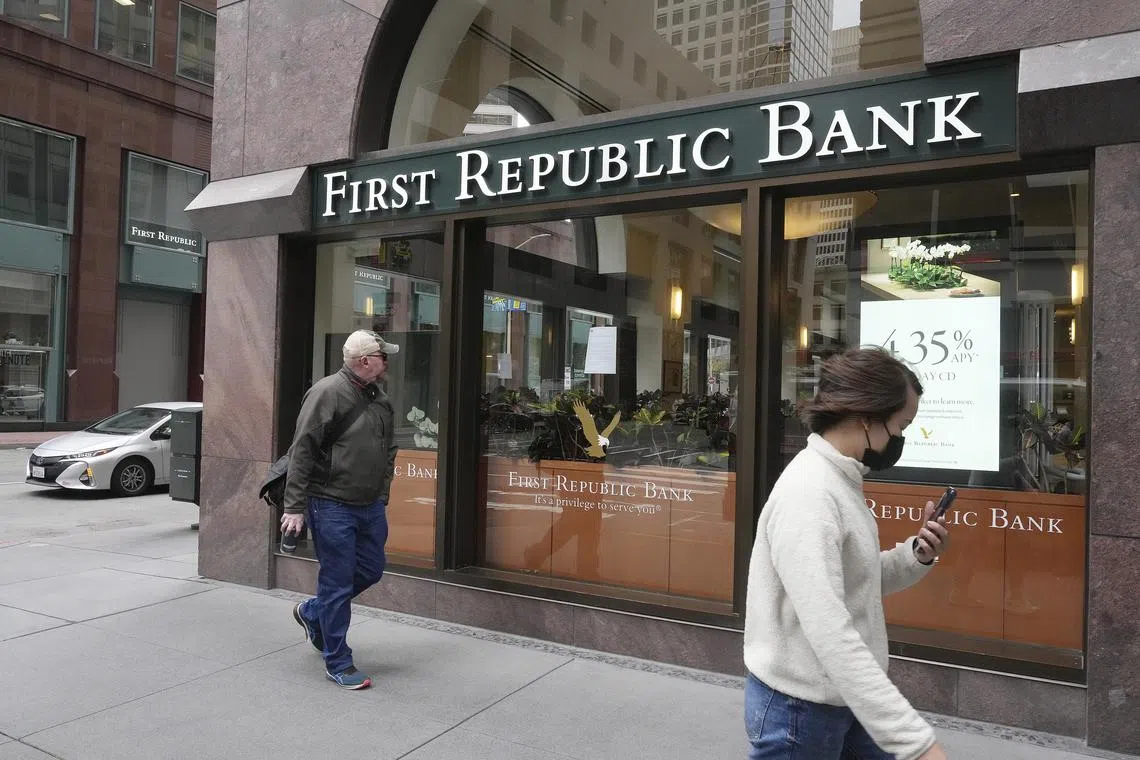US regulator weighs overhaul of business deposit insurance after bank failures
Sign up now: Get ST's newsletters delivered to your inbox

First Republic Bank collapsed on Monday in the second-biggest bank failure in US history.
PHOTO: NYTIMES
Washington - A top US regulator wants a sweeping overhaul of deposit insurance after recent bank failures partly drained a pool of money the government uses to protect lenders’ clients.
The Federal Deposit Insurance Corp (FDIC) on Monday laid out three options for the bedrock fund, which currently covers up to US$250,000 (S$334,000) on most accounts.
The regulator highlighted the impact of technological changes and high concentrations of uninsured depositors in pockets of the banking system as reasons for a possible overhaul.
The FDIC said in its report that switching to a “targeted coverage” approach, where business accounts get more coverage than the current cap, would be the best option for financial stability.
Such a change, however, would require congressional action.
Other options are maintaining coverage as is, or switching to cover all deposits, the FDIC said.
Although the agency did not commit to taking a particular path, Monday’s report launches what would be one of the most significant policy changes to stem from the recent banking crisis.
The FDIC’s decision to cover all deposits – even those above the US$250,000 limit – for clients of Silicon Valley Bank and Signature Bank following their failures in March sparked a fierce debate over how the system should be changed.
The collapses and the government’s response “raised fundamental questions about the role of deposit insurance in the United States banking system”, FDIC chairman Martin Gruenberg said in a statement.
“This report is an effort to place these recent developments in the context of the history, evolution and purpose of deposit insurance.”
Critics of the banking system have called for the FDIC to increase the insurance cap.
Senator Elizabeth Warren, a Massachusetts Democrat, in March said the agency should increase its US$250,000 cap, questioning whether it should be as high as US$10 million.
A separate debate is also raging over who should pick up the tab for replenishing the Deposit Insurance Fund (DIF) after it was used to cover uninsured depositors from the two failed banks.
First Republic
Questions around the DIF again swirled on Monday after First Republic Bank collapsed in the second-biggest bank failure in US history.
As part of a deal for JPMorgan Chase & Co to buy the lender, it will share in both the losses and the potential recoveries on loans with the FDIC.
The regulator estimated on Monday that the cost to the fund will be about US$13 billion.
The DIF is a bedrock of the US financial system. It has also been a political lightning rod because the pot is filled and refilled by all insured banks kicking in quarterly fees known as assessments.
The amount is based on formulas and, despite occasional gripes over its costs, the system has generally worked for years.
Silicon Valley Bank, for example, had many depositors who held more than US$250,000 in their accounts, including many start-up businesses that desperately needed cash.
Targeted coverage
On Monday, the FDIC said an upward trend in uninsured depositors had increased risks for bank runs.
According to the regulator, the proportion surged to 47 per cent in 2021 – the highest level since 1949.
The agency added that changes in technology, which allow information to spread quickly and depositors to easily withdraw funds, present acute challenges.
In its preferred “targeted coverage” approach, the FDIC would extend coverage to business payment accounts.
Losses on those accounts may impact payroll and other operational functions, the agency said.
The regulator did not say it wanted to increase the limit for investment accounts, signalling that they would not get the same new protections under the plan.
Regardless, the FDIC said increasing coverage for payments accounts could “require a significant increase in assessments”, or the fees that US banks must regularly kick in to the fund.
House Financial Services Committee chairman Patrick McHenry said he was pleased that the FDIC acknowledged that Congress would need to get involved to make changes to deposit insurance.
But he still took some issue with the agency’s preference.
“It’s concerning that the FDIC is immediately jumping to the conclusion that a public sector solution is the only viable option, rather than considering private sector options that address the specific needs of large companies,” the North Carolina Republican said in a statement.
“The House Financial Services Committee will continue to evaluate all options to ensure Americans’ confidence in the safety and soundness of our banking system.” BLOOMBERG


